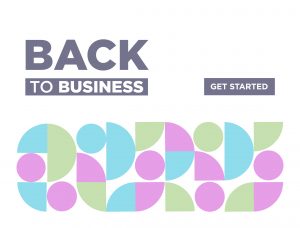Businesses reopening during Phase 2 and 3 of the BC Restart Plan must develop a COVID-19 Safety Plan. Your safety plan details the specific measures you are taking to keep customers and employees safe if and when you reopen during the pandemic.
These measures could include providing PPE (Personal Protection Equipment), such as face masks, to employees, and developing protocols around its use. You may even require customers to use PPE if the nature of your business makes physical distancing difficult.
What is PPE?
PPE is a type of protection to reduce the risk of transmitting COVID-19. The coronavirus is transmitted via liquid droplets when someone with the virus coughs or sneezes near another person. It can also be spread when someone touches an infected person or a contaminated surface and then touches their eyes, mouth, or nose.
PPE can help reduce the risk of transmission in these situations. Types of PPE include medical and non-medical face masks, gloves, gowns and aprons, and face shields and eyeglasses. The most common type of PPE outside healthcare settings is face masks.
When to Use PPE
Part of developing your safety plan is selecting the right measures to keep employees and customers safe. The best ways to prevent the transmission of COVID-19 are handwashing, extensive cleaning and disinfecting, physical distancing, and ensuring sick workers stay at home. Under WorkSafeBC’s guidelines to safe reopening, PPE is considered fourth-level protection.
If you think the first three levels of protection (elimination, engineering controls, and administrative controls) don’t go far enough to protect employees and customers, you should consider the use of PPE and follow guidelines published by WorkSafeBC and your relevant industry body.
Typically, PPE is recommended when physical distancing is difficult and physical barriers, such as plexiglass, are not practical. In these instances, cloth and surgical face masks can reduce the spread of the virus from the wearer to a nearby person. For that reason, you may need to ask customers to wear face masks to protect your staff, for example in a hair salon, as well as providing PPE for your employees.
As a private business, you are able to set rules for entering your premises, including requiring customers to wear a non-medical mask as part of your COVID-19 Safety Plan. Clearly explain the purpose of PPE to customers so they understand why it’s required.
Types of Face Masks
There are two options when it comes to choosing a face mask for employees.
Cloth Masks
Cloth masks can reduce the spread of droplets from the wearer to someone else. However, they offer limited protection to the wearer because they don’t form a tight seal around the face. They are easy to make and can be reused when washed daily.
Surgical (or Medical) Masks
These familiar blue masks are typically found in healthcare settings, but are being widely used during the pandemic. Like cloth masks, they can reduce the spread of droplets from the wearer, without protecting the wearer in a significant way. Typically, these masks are primarily for health workers. However, it is possible to acquire them from medical equipment suppliers or even some general retailers. These are single-use masks.
You may also have heard of respirator masks, such as N95 masks, that provide two-way protection for both the wearer and people around the wearer. These masks are intended for the exclusive use of health workers.
Guidelines for Using Face Masks
To make face masks as effective as possible, it’s important to educate employees about their use. Stress they are primarily for the protection of other people, and ensure workers and customers know they should still follow physical distancing rules and stay home if sick.
WorkSafeBC published guidelines around selecting and using masks. These include:
- Keep your mask clean and dry
- Change your mask if it becomes wet, soiled, or damaged
- Use surgical masks only once
- Wash cloth masks every day and store in a clean, dry place
- Follow good hygiene guidelines even with a mask
- Don’t touch your mask while wearing it
Where to Get PPE
There has been a global shortage of all types of PPE during the pandemic. Small Business BC is compiling a list of PPE suppliers for our clients who need surgical masks and other equipment. Here are a couple to try:
- Rapid Response Platform can match businesses with suppliers for various types of PPE and other supplies
- XO-OPTIX provides safety-approved eye protection
- Retailers such as Canadian Tire and Staples occasionally have supplies of surgical and reusable cloth masks
Due to the shortage of PPE, please only order what you need.
You could also encourage employees to make their own masks, or buy them from enterprising local businesses, such as Blackwood Apparel, Search and Rescue Denim, and Glasnost.
If you decide your safety plan requires the use of PPE, please remember that it should be seen as a last line of defence—not a substitute for the correct hand washing, hygiene, and physical distancing.
Find Out More

At Small Business BC, we’re committed to helping business owners reopen in a safe and successful way. Our Back to Business campaign features specific advice and guidance in the following areas:
- Operational Health & Safety
- Restart Strategy
- Marketing & Communications
Alternatively, visit our BC Business COVID-19 Support Service and connect with our Business Advisors to get answers to your specific questions on reopening.